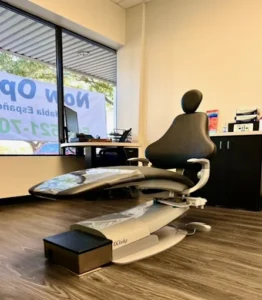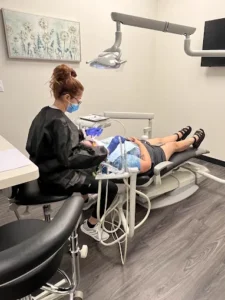The problem of temperature sensitivity is a common concern that doctors of dentistry continuously encounter because experiencing such sensitivity brings significant pain and complications to patients. Having ice-cold drinks during games is summer perfection. During winter, consuming a hot beverage provides both physical warmth and emotional comfort to the entire body. Dental sensitivity prevents many people from tasting their favorite drinks, but you are not alone. More than 45 million Americans experience tooth sensitivity to hot and cold temperatures, and the majority of them benefit from home treatment, which solves their problems.
If you also suffer from tooth sensitivity and you want to enjoy your favorite hot and cold beverages, then you should identify the root disease causes with your dentist to create at-home oral care adjustments or get dental care treatments at their clinic for repairing damaged teeth.
What Is the Reason for My Toothache When I Drink Something Cold?
No one should experience tooth sensitivity to either cold or hot temperatures unless they need dental treatment. You will feel discomfort when hot or cold substances contact your teeth. Sometimes tooth sensitivity is temporary. If sensitivity persists for longer than 3-4 days, then visit the dentist to evaluate and identify the source of your tooth problem.
Tooth sensitivity is due to multiple reasons. Learning about the root causes enables you to find ways to prevent further tooth damage. Remember that if your teeth are damaged, then you require proper dental care to restore damaged teeth.
Symptoms of Temperature Sensitivity
Tooth pain occurs during hot or cold exposure. When patients experience temperature changes, the pain strikes them like a needle. Other people who drink hot or cold beverages normally have mild continuing pain after consumption of hot or cold drinks. In most cases, the duration of your temperature sensitivity after exposure determines the treatment options for your dental problem.
Less Than 15 Seconds of Sensitivity
Brief exposure to hot or cold beverages causes temporary pain, which indicates the condition is probably not significant. The underlying cause of sensitivity in these events is usually due to light tooth cavity development, lost dental fillings, or reduced gum tissue near the teeth. A dental checkup should be scheduled right away, but it does not need emergency dental intervention.
Sensitivity That Lasts 30 Seconds or More
In this case, you may suffer from permanent damage to your tooth pulp. Deep dental decay or accidental injuries together with serious infections could have caused this type of sensitivity, leading to tooth pain. The best course of action is to immediately book an appointment with your dentist to perform a complete assessment during this time when pain is constant and unbearable.

Why Does My Tooth Hurt When I Drink Something Cold?
Here are some main causes of tooth sensitivity to cold and tooth pain.
Tooth Grinding
Bruxism, or tooth grinding, slowly damages vital tooth enamel over time. Exposure of the tooth’s root surfaces happens when the enamel wears off, which can develop cracks.
If you have the habit of grinding while you sleep, your dentist may often recommend wearing a mouthguard throughout your sleep to protect your teeth from further damage.
Receding Gums
Gum disease, along with inflammation, creates spaces, and sensitive roots become visible. The gums experience inflammation because of bacterial contact and then start moving away from the teeth as inflammation progresses. Pain and sensitivity develop because the roots become exposed.
Daily brushing and flossing during the initial stages of gum disease successfully minimize both inflammation and sensitivity as well as discomfort. Complicated cases of gum disease need medical care by a dentist or an endodontist.
Cracks in a Tooth
Your tooth becomes damaged due to fractures which allows sensitive pulp nerves to become visible. Exposure of nerves results in both sensitivity and pain.
Tooth Decay
The outcome of tooth decay creates holes that form into cavities within the teeth. Such cavities can also expose nerves.
Keep visiting your dental care expert for routine cleanings and examinations to prevent tooth decay. By detecting and filling cavities during dental care, your dentist prevents and eliminates the sensitivity related to those cavities.
Abscess
Untreated bacterial infections in cavities or dental injuries will create an abscess within the tooth. An abscess is a pocket within the tissue that holds the pus.
Preventing abscesses should be considered the most effective form of treatment. Having a root canal is the most suitable choice when an abscess already exists within your tooth structure. Consult an endodontist for diagnosis and the best treatment option.
Loss of Tooth Enamel
Your teeth have a thin, superficial, hard surface called tooth enamel that covers them. The teeth stay protected by tooth enamel; however, this layer becomes weaker over time after incidents of trauma, making it vulnerable to breakdown. Exposure of nerve endings occurs after enamel loss, which results in both discomfort and sensitivity.
The damage to tooth enamel results from aggressive teeth brushing habits and inappropriate tooth care products as well as dental bleaching sessions and accidental injuries to teeth.
How to Treat Tooth Sensitivity at Home
There is a distinct relationship that exists between your teeth and certain temperature sensations. When you consume hot or cold fluids, your tooth suddenly experiences unpleasant sensations. Cold drink consumption triggers discomfort and pain because sensitive nerves in the dental pulp are exposed due to root exposure, enamel reduction, and tooth cavities as well as cracks.
Making changes in your daily routine might help decrease dental discomfort when you feel mild temperature sensitivity.
Your temperature sensitivity can improve through the following changes:
- Using a straw to drink hot or cold liquids prevents beverages from touching the teeth, which helps to minimize sensitivity.
- Limit acidic food intake, as these products damage enamel while irritating dentin and pulp tooth layers, so sensitivity might decrease when you avoid consuming these food products.
- You must replace your toothbrush. Harsh toothbrush bristles and forceful brushing serve to irritate teeth and worsen sensitivity. Using a softer bristled toothbrush and avoiding hard brushing will help reduce temperature sensitivity.
- The ingredients found in specific sensitive teeth toothpaste effectively decrease hot and cold drink sensitivity while simultaneously improving your oral health conditions. Use toothpaste for sensitive teeth like Sensodyne to protect your teeth and relieve sensitivity so that you can enjoy your favorite hot and cold foods.
- Change your mouthwash to minimize tooth sensitivity. You should select a fluoridated mouthwash because these products work without damaging sensitive tooth areas in dentin or pulp.
- Regular teeth grinders should use a mouthguard throughout the night to avoid dental wear and reduce the risk of dental damage.
These home remedies can be effective for mild toothache. If you feel unbearable continuous pain, then immediately consult with a dentist or endodontist for the best treatment options to save your teeth.
Get Relief By Treating the Source of Your Tooth Pain
Do you need root canals or other endodontic treatments to save your natural teeth? Celebrate Dental is here to preserve your natural teeth, allowing you to maintain your bite and continue looking and feeling like yourself.
Contact us today to schedule a consultation.








